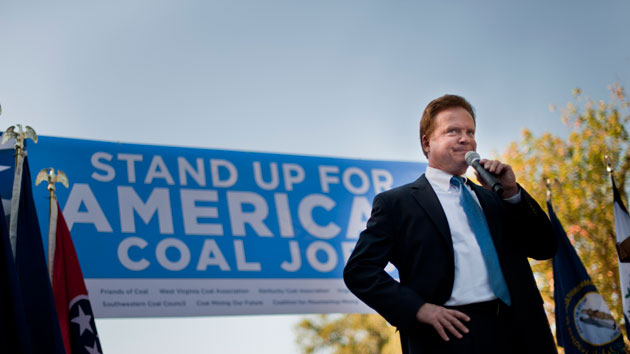
Former Sen. Jim Webb (D-Va.) Pete Marovich/ZUMA
Jim Webb is running for president. The former secretary of the Navy and Virginia senator launched a presidential exploratory committee on Thursday, becoming the first Democrat to formally dip his toe in the 2016 waters. Webb explained his candidacy in a video that looks like it was filmed by the people who make commercials for personal-injury attorneys:
A Republican for most of his life, Webb endeared himself to Democrats when he switched parties and beat incumbent GOP Sen. George Allen in 2006 by just a few thousand votes. Webb ran that campaign on an anti-Iraq War message, touting his own experience in Vietnam, but may have been pushed across the finish line by Allen, who called a Democratic volunteer “Macaca” (an obscure North African racial slur) at a campaign event.
As a senator he was a bit of an iconoclast, defined mostly by his disdain for Washington (something most senators espouse but rarely act on). His first meeting with President George W. Bush ended with the senator walking away furiously, reportedly on the verge of throwing a punch, after Dubya asked Webb about his son serving in Iraq. He sought to carve out a niche for himself by working for criminal justice reform, but left office before any political momentum developed on the issue. And then he left, after one term, leaving Democrats to defend a purple seat against Allen. His most impressive resume item may be his Navy Cross citation:
On 10 July 1969, while participating in a company-sized search and destroy operation deep in hostile territory, First Lieutenant Webb’s platoon discovered a well-camouflaged bunker complex which appeared to be unoccupied. Deploying his men into defensive positions, First Lieutenant Webb was advancing to the first bunker when three enemy soldiers armed with hand grenades jumped out. Reacting instantly, he grabbed the closest man and, brandishing his .45 caliber pistol at the others, apprehended all three of the soldiers. Accompanied by one of his men, he then approached the second bunker and called for the enemy to surrender. When the hostile soldiers failed to answer him and threw a grenade which detonated dangerously close to him, First Lieutenant Webb detonated a claymore mine in the bunker aperture, accounting for two enemy casualties and disclosing the entrance to a tunnel. Despite the smoke and debris from the explosion and the possibility of enemy soldiers hiding in the tunnel, he then conducted a thorough search which yielded several items of equipment and numerous documents containing valuable intelligence data. Continuing the assault, he approached a third bunker and was preparing to fire into it when the enemy threw another grenade. Observing the grenade land dangerously close to his companion, First Lieutenant Webb simultaneously fired his weapon at the enemy, pushed the Marine away from the grenade, and shielded him from the explosion with his own body. Although sustaining painful fragmentation wounds from the explosion, he managed to throw a grenade into the aperture and completely destroy the remaining bunker.
Webb has at least a few bumps to smooth over, though. He defended the Confederate flag and “the venerable Robert E. Lee” in his book Born Fighting, about the Scots-Irish, and in 1979, he wrote an essay for Washingtonian titled “Why Women Can’t Fight”—a spirited case against admitting women into service academies. As a senator from a major coal-producing state, he opposed proposals to combat climate change. And only last month expressed his support for same-sex marriage. Beating an entrenched Republican in Virginia as a centrist in 2006 is one thing—but winning a Democratic presidential nomination requires winning Democratic primary voters.












